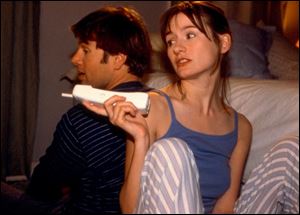
Lovely & Amazing: Telling the truth about women
8/16/2002
James Le Gros and Emily Mortimer are among the cast of Lovely & Amazing, a new film that makes its point quietly but powerfully.
One imagines director Nicole Holofcener sitting on the lip of a fountain in a city square somewhere, observing people for hours and wondering: “Why are movie characters never like people I know? Why can't movies about everyday life be fun and melancholy and believable?” Her new film, Lovely & Amazing, is something like a brisk, clear-headed response. It knows people, especially women, and knowing what it knows, can not bear to reduce them to rusty caricatures.
It tells the story of an insecure mother and her three insecure daughters, and this only sounds routine. A small, personal independent film about four women that never feels like what you'd expect from a small personal, independent film about four women, Lovely & Amazing is something of a minor miracle: a smart, breezy, and accessible picture about normal people who say the wrong things - minus the fluff.
Take Michelle Marks, played with VJ Block Fits: Block Depth: .75i Expansion .07i ###### Flowing Text Overset ####### acerbic intelligence by Catherine Keener, who is to acidic what Gwyneth Paltrow is to chilly. You feel for Michelle even as you cringe at the thoughtlessness that pops out of her mouth. We first meet her in one of those upscale gift shops that sell $35 light switch covers. A former homecoming queen with a daughter, a distant husband, and a bloated sense of her own importance, she makes tiny $50 chairs out of twigs that only a Blair Witch would love.
When she runs into high school friend who has become a pediatrician, she's shocked. “We are 36,” the woman says. “But we're not 36 36,” Michelle answers.
When we meet her family, we wonder if denial isn't hereditary. There's Michelle's sister, Elizabeth (Emily Mortimer), a neurotic actress less devoted to her craft than to rescuing stray dogs. She's paralyzed by whether she's sexy enough, skinny enough, talented enough. Mainly, she thinks her upper arms are flabby.
Annie (Raven Goodwin) is their adopted sister, an 8-year old African-American girl who eats too much and tells her new mom, Jane (Brenda Blethyn), she wants white skin and straight hair. For her part, Jane goes into the hospital for liposuction, leaving Annie in the care of Elizabeth and Michelle.
What's remarkable about Lovely & Amazing is how you never think about what it's really about while you're watching it. Holofcener doesn't moralize about self-esteem or body image or race, or anything. Minority Report and Lovely & Amazing couldn't be more dissimilar, but both are rarities: movies that convey big ideas without dropping an art-house brick of significance on the audience.
Holofcener, who also wrote the screenplay, knows how people talk to each other and what people say versus what they mean. The film is set in Los Angeles but it's not unlike New York City in Holofcener's first film, Walking and Talking (1996); her characters are awkward at being sincere, and she has the sharp eye of a director able to spot small facial slips of hurt and disinterest. There isn't a broad moment in the film.
In short: What we have here is the anti-Ya Ya. Remember Divine Secrets of the Ya-Ya Sisterhood? Midway through that early summer schmaltz factory, Ellen Burstyn dances beneath a window for James Garner. She twirls, waving a scarf behind her, picturesquely surrounded by sparklers staked into the front lawn. She does this because A. the plot asks her to, and B. it looks good in the trailer. If the women of Lovely & Amazing spotted her coming, they'd cross the street.
Holofcener's characters have the problems real people have and do things real people do. Consider Elizabeth again. She has one scene so searing, my first instinct was to duck under the seat and stay there until it was over. She is lying in bed with Kevin McCabe, a TV actor (Dermot Mulroney) who rejected her for his show, when she asks a favor: If she stands beside the bed naked, will he tell her what he thinks of her body?
He asks if this is a sick fetish thing. She laughs, gets up, and stands at the end of the bed in full-frontal nakedness. He rubs his chin and gives an Oh-Boy-What-Have-Gotten-Myself-Into look.
You cringe. He cringes. You climb to the edge of your seat. Then something remarkable happens: He gets into it, and becomes methodical, and not only about her imperfections but what he likes. He can't help turning her flaws into attributes, and the scene itself transforms from merely crushing into a complex moment of tenderness, pain, shyness, and relief.
It's here that I realized there is a generosity of spirit in Lovely & Amazing that's rare in people, let alone in movies. Holofcener has made one of the year's best, a subtle work of empathy. Kevin critiques Elizabeth from head to toe, and when he's done, he asks if she wants him to do any more. Her answer is as sad and naive as it is hopeful: “Is there more?”